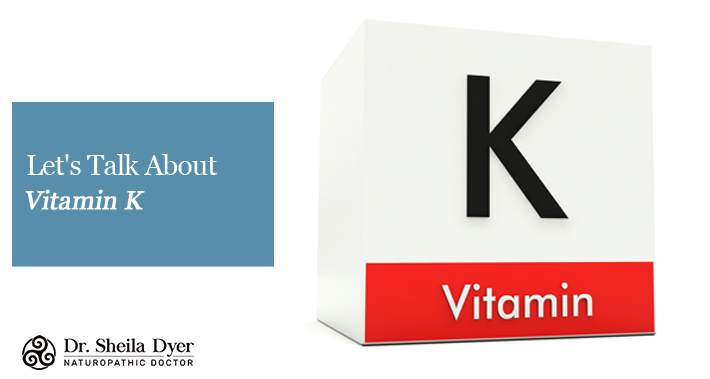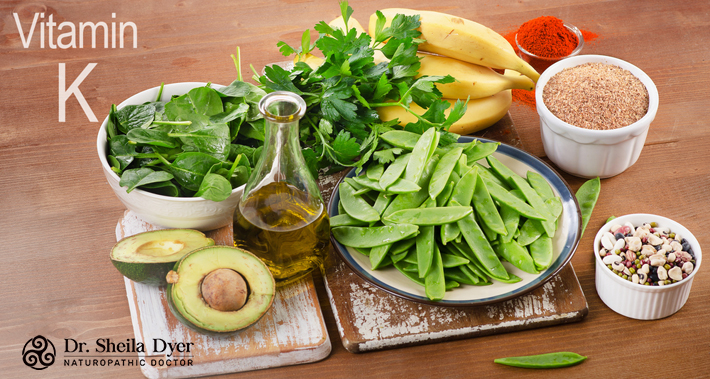
I’m Dr. Sheila Dyer, ND, a naturopathic doctor in Toronto, and if you’re asked about which vitamins are important, there’s a few that probably come to mind immediately.
You might think of vitamin C, and its role in naturally supporting your immune system.
Or you might lament the fact that during these long, cold, Canadian winters you’re likely not getting enough vitamin D, the “sunshine” vitamin.
Maybe the skin health benefits of vitamin E come to mind.
You might even think of the nine members of the vitamin B complex.
But there are also some lesser known vitamins which you need, even if you’re not entirely sure what they do for you.
Vitamin K is one of these.
Let’s take a closer look at it.
What Is Vitamin K?
Vitamin K is a nutrient required for blood clotting.
It was originally discovered and reported on in Germany, where it was given the name “Koagulationsvitamin” which literally translates to “coagulation vitamin”.
As an essential nutrient, vitamin K can’t be produced by the body.
To get enough, you need to eat foods high in vitamin K or take a supplement.
There are two forms of vitamin K:
- Phylloquinone, or vitamin K1, which is found in leafy greens and other plant based foods
- Menaquinone, or vitamin K2, which is found in animal products and fermented foods
Some researchers and scientists believe because the roles of vitamin K1 and K2 are distinct enough that they should be classified as distinct nutrients, rather than two parts of a whole.
What Exactly Does Vitamin K Do?
Vitamin K has benefits beyond aiding in blood coagulation.
Let’s have a look at some of the other reasons you’ll want to ensure you’re getting enough.
1. It’s Good For Your Heart
Heart disease is the second leading cause of death in Canada, next only to cancer, which means taking care of our hearts should be a top priority.
A study in the Journal of Nutrition found vitamin K2 associated with reduced risk of calcium build up in the arteries.
It’s also linked to a decreased risk of developing heart disease.
This makes it a useful tool as a naturopathic approach to preventing heart disease
2. It’s Good For Your Bones
Osteoporosis is a disease which affects bone health.
It literally means “porous bones” and increases the risk of experiencing bone fractures.
Vitamin K2 in particular is used by your body to metabolize calcium.
Calcium, of course, is the primary mineral component of your bones.
This vitamin activates the proteins in calcium responsible for helping bones grow and maintaining their health.
Supplementing with vitamin D, vitamin K, and calcium is a great three pronged approach I sometimes recommend as a naturopathic solution for osteoporosis.
If you suspect you have osteoporosis, though, Book your appointment with me today before beginning a supplement routine.
3. It’s Good For Your Teeth
For the same reasons vitamin K2 helps promote bone health, it’s also thought to be beneficial for your smile.
Osteocalcin, one of the proteins which is responsible for bone metabolism, is also responsible for dental health.
This protein stimulates the growth of dentin which is the tissue beneath your tooth enamel.
Vitamin K2 activates osteocalcin.
4. It May Reduce Risk Of Cancer
There is emerging evidence to suggest vitamin K2 may impact some types of cancer.
Limited studies have shown it may play a role in reducing the recurrence of liver cancer.
Additionally, it may improve survival rates.
More research in this area is needed at this time, but so far it seems promising.
What Is The Main Source Of Vitamin K?
Dietary sources of vitamin K include:
- Soybean oil
- Natto
- Fermented soybeans
- Chicken
- Cheese
- Pork Chops
- Eggs
- Beef liver
- Mustard greens
- Kale
- Spinach
- Broccoli
- Swiss Chard
- Cabbage
- Brussels sprouts
- Prunes
RELATED: Is Soy Good For You?
What Happens If Vitamin K Is Low?
Due to its role in blood clotting, if you have a vitamin K deficiency, it could result in:
- Blood in the mucous membranes in the body
- Bloody stool, which appears black and tar like
- Easily bruising
- Blood clots under nails
In infants, your doctors might notice:
- If circumcised, bleeding surrounding the penis
- Bleeding around the area where the umbilical cord was removed
- Nosebleeds
- Bleeding in the brain
- Blood in the nose, skin, and gastrointestinal tract
Those at risk of vitamin K deficiency include:
- Those on certain medications such as anticoagulants and antibiotics
- People with conditions that inhibit fat absorption
- Vegetarians and vegans, since it’s mostly found in animal products
Can Too Much Vitamin K Be Harmful?
Vitamin K is a fat soluble vitamin.
This means excess amounts will be stored in your body.
Compare this with water soluble vitamins, where you get rid of whatever you don’t need in your urine.
RELATED: What Can Your Pee Teach You About Your Health?
It’s difficult to get too much vitamin K from diet alone.
However, it may be possible if you’re using supplements to get your daily dose.
Too much vitamin K may lead to blood clots and result in strokes and heart attacks.
So if you’re thinking of adding vitamin K supplementation to your health regimen, it’s best to…
Book Your Appointment With Dr. Sheila Dyer, ND, Today
Are you worried you may have a vitamin K deficiency?
Maybe you’re on medication that inhibits its absorption.
Or perhaps you follow a vegan or vegetarian diet.
Have you been noticing signs of low vitamin K, such as small cuts seeming to be taking a long time to heal properly, or that you’re bruising more easily than you used to?
I’m Dr. Sheila Dyer, ND, a Toronto based naturopathic doctor and I’m here to help.
If you’re worried about a deficiency in vitamin K, or any other vitamins, I can work with you to build a nutrition plan that helps ensure you’re getting everything your body needs.
Book your appointment with me, Dr. Sheila Dyer, ND, today.
If you have questions about naturopathic medicine, or would like to start with your first consultation, contact me, and let’s book an appointment.
Dr. Sheila Dyer, ND1080 Dovercourt Rd,
Toronto, ON M6H 2X8
(416) 554-5135
► https://g.page/DrSheilaDyerNd
Dr. Sheila Dyer is a Naturopathic Doctor and a practicing registered nurse offering holistic healthcare with a scientific focus
